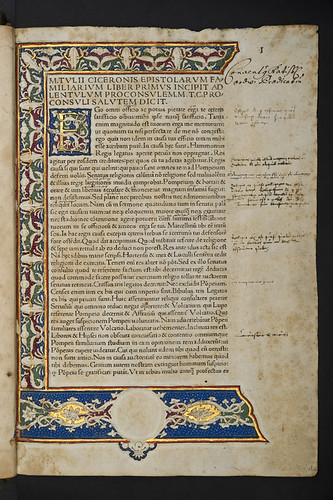Cicero, Marcus Tullius: Epistolae ad familiares.
[Venice: Vindelinus de Spira] 1470.
Fol. [112 210 36 4-1310 148]. [136] leaves, the first blank.
ISTC ic00506000; BMC V 156; Bod-inc C-259; GW 6803.
| Shelf-mark: | Sp Coll Hunterian Be.1.5 (see main library entry for this item) |
| Variant: | 1/2r, line 6: “... oībus ...” as in BMC, not “... omnibus ...” as in GW Anm. 1. |
| Note: | Printer's pin-holes visible. |
| Provenance: | Regensburg, Bavaria, Dominicans, S. Blasius: inscription on 1/2r “Conuent[us] Ratisb[onensis] ord[in]is Praedicat[oru]m”. Edward Harley (1689-1741), Lord Harley; from 1724 2nd Earl of Oxford: see Binding. Thomas Osborne (d. 1767), bookseller: purchased all the Harleian printed books; top corner of first front flyleaf cut off - as in many other Harleian volumes - probably by Osborne to remove his earlier price (cf. J.B. Oldham, 'Shrewsbury School bindings', p.114); no. 5025 in Osborne’s 'Catalogus bibliothecae Harleianae', vol. 1 (London: 1743) and no. 1153 in his 'Catalogus bibliothecae Harleianae', vol. 3 (London: 1744). Philip Carteret Webb (1702-1770), barrister, FSA, FRS: armorial bookplate on verso of front free endpaper; Webb's shelfmark "D-2" on front flyleaf; lot 2051 in 'A catalogue of the very valuable library of Phillip Carteret Webb ... which will begin to be sold by auction, by S. Baker and G. Leigh ... on Monday, February the 25th, 1771 ...' [London: 1771]. William Hunter (1718-1783, physician and anatomist: source unknown, but perhaps bought at the sale of Webb's library in 1771. University of Glasgow: Hunterian bequest 1807; Hunterian Museum bookplate on front pastedown, with former shelfmark “Aj.3.5”. |
| Binding: | England, 18th-century gold-tooled red morocco; bound for Lord Harley by Christopher Chapman. On both covers triple fillets form two concentric frames: within the outer frame is an ornamental roll (Nixon, ‘Harleian bindings’, pl. 14, Chapman roll 2), and within the inner frame is an ornamental roll of interlocking crescents (not reproduced in Nixon) and an ornamental roll (Nixon, ‘Harleian bindings’, pl. 14, Chapman roll 4); both covers have a lozenge-shaped centre-piece, made up of several individual tools (including Nixon, ‘Harleian bindings’, pl. 15, Chapman nos 5, 8, 14a, and 14b). The head and foot of the spine are decorated with Chapman roll 2 (Nixon, ‘Harleian bindings’, pl. 14), and the tools used in the spine compartments include Nixon, ‘Harleian bindings’, pl. 15, Chapman nos 1a, 1b, 4, and 17; the turn-ins are decorated with Chapman roll 2; marbled endpapers. Rebacked and original spine compartments put back. Size: 348 x 247 mm. |
| Leaf size: | 341 x 231 mm. |
| Annotations: | Frequent marginal and interlinear annotations in Latin in a 16th-century hand; annotations in a different hand in Greek and Latin on 11/10v (f. 108v); occasional ‘nota’ marks and underlining; early signatures; foliated in a later hand in a mixture of roman and arabic numerals; running book numbers ‘VIII’, ‘Nonus’, and ‘Decimus’ from 6/9v-8/7r (ff. 57v-75r). |
| Decoration: | On 1/2r a seven-line initial ‘E’ is supplied in gold and set on a square ground of white-vine decoration defined in crimson, green and blue; the page is further decorated (in the same colours) with three borders which are outlined in gold, red and black; the borders at the inner and upper margins contain a repeated design of winged heads, and the border at the lower margin contains white-vine decoration on a blue background (the latter decorated with groups of white dots) with a blank space in the centre for a shield; other principal initials supplied in gold with similar white-vine decoration; smaller initials supplied in alternate blue and red. |
| Imperfections: | Wanting the first blank leaf. |






